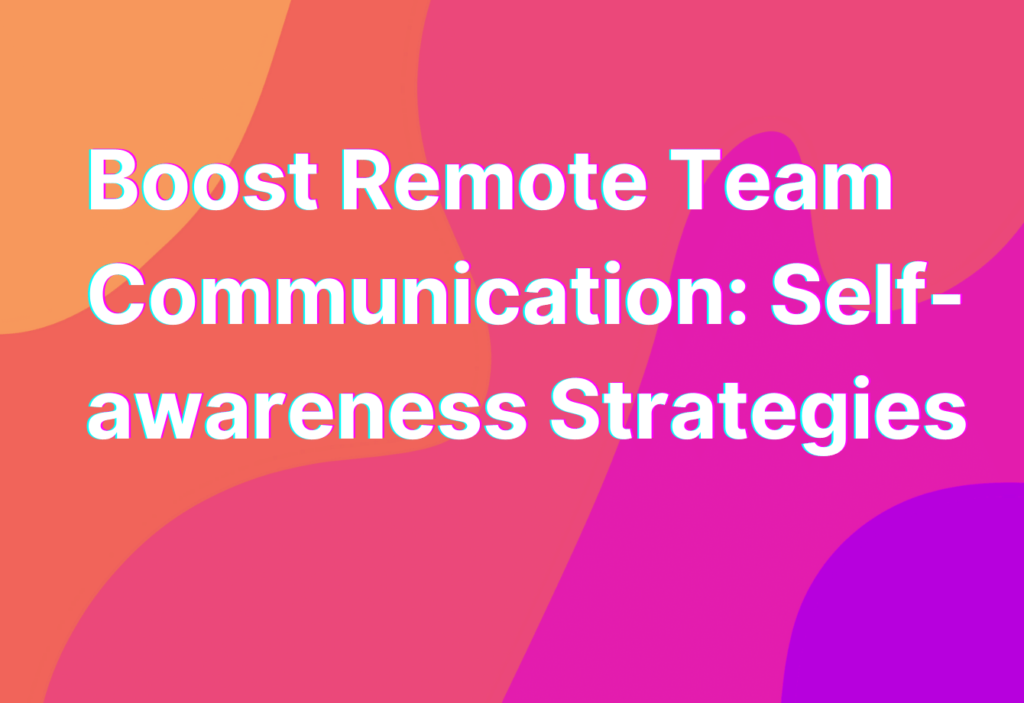Boost Remote Team Communication: Self-awareness Strategies
Hey there, remote work enthusiasts! It’s Ashley, your friendly remote work advocate, back with another article to help you thrive in the virtual workplace. Today, we’re diving into the importance of self-awareness in remote team communication. So grab your favorite cup of coffee (or tea, if that’s your thing) and let’s get started!
The Power of Self-awareness
Self-awareness is like the secret sauce that can take your remote team communication to the next level. When team members are self-aware, they have a better understanding of their own strengths, weaknesses, and communication styles. This awareness allows them to adapt and collaborate more effectively with their remote colleagues.
But how can you cultivate self-awareness within your remote team? Don’t worry, I’ve got you covered with some strategies that are as effective as they are fun!
1. Reflect and Assess
Take a moment to reflect on your own communication style. Are you more direct or indirect? Do you prefer written communication or video calls? Understanding your own preferences and tendencies can help you communicate more effectively with your team members.
Pro tip: If you’re not sure about your communication style, try taking a personality test like the Myers-Briggs Type Indicator or the DISC assessment. These tests can provide valuable insights into your communication preferences.
2. Embrace Active Listening
Active listening is a superpower in remote team communication. It involves fully focusing on the speaker, asking clarifying questions, and providing feedback. By practicing active listening, you can ensure that you understand your colleagues’ messages and avoid misunderstandings.
Remember, remote communication can sometimes lack the non-verbal cues we rely on in face-to-face interactions. So, active listening becomes even more crucial in the virtual world.
3. Use the Right Tools
Technology is your best friend when it comes to remote team communication. Make sure you’re using the right tools to facilitate effective collaboration. From project management platforms like Trello and Asana to communication tools like Slack and Zoom, there’s a wide range of options to choose from.
Pro tip: If you’re looking for an efficient task tracking tool for your remote team, check out this article on Remote Teamer. It provides a comprehensive guide to task tracking tools that can supercharge your team’s productivity.
4. Foster Psychological Safety
Psychological safety is the foundation of effective remote team communication. When team members feel safe to express their ideas, ask questions, and share feedback without fear of judgment or retribution, communication flourishes.
As a remote team leader, it’s essential to create a supportive and inclusive environment where everyone feels valued and heard. Encourage open dialogue, celebrate diverse perspectives, and address conflicts promptly to maintain psychological safety within your team.
5. Seek Feedback
Feedback is a gift, even in the remote work world. Actively seek feedback from your team members on your communication style and areas for improvement. This not only demonstrates your commitment to growth but also encourages others to reflect on their own communication practices.
Pro tip: Consider implementing regular feedback sessions or anonymous surveys to gather insights from your team. This can help identify communication gaps and foster a culture of continuous improvement.
Wrapping Up
And there you have it, folks! Self-awareness is the secret ingredient to boost remote team communication. By reflecting on your own communication style, embracing active listening, using the right tools, fostering psychological safety, and seeking feedback, you can create a virtual workspace where effective communication thrives.
Remember, remote work is all about adaptability and continuous learning. So, keep experimenting with different strategies and find what works best for your team. Together, we can make remote work not just a trend, but a way of life!


